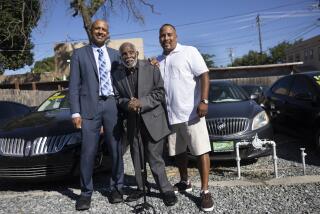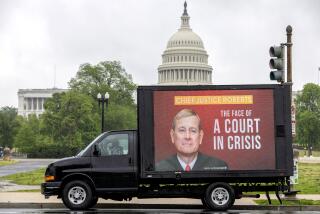A system of plea bargains
- Share via
The right to a fair trial by a jury of one’s peers is one of the most sacred guarantees of the Bill of Rights, but the dirty secret is that it isn’t exercised very often. More than 97% of federal convictions and 94% of state convictions result from guilty pleas. Recognizing that reality, the Supreme Court ruled 5 to 4 this week that defendants have a constitutional right to be informed by their lawyers about the possibility of a plea bargain and the implications of turning one down.
The 6th Amendment guarantees a defendant not only a trial by jury but also “the assistance of counsel for his defense.” In 1984, the court held that a defendant could challenge his conviction or sentence on the grounds that his lawyer’s ineffectiveness “so undermined the proper functioning of the adversarial process that the trial cannot be relied on as having produced a just result.” But what if a defendant is harmed by his lawyer’s malpractice at an earlier stage in the process? That was situation in the two cases decided by the court this week.
Galin E. Frye was charged by the state of Missouri with driving with a revoked license, a felony because he had several previous convictions. The district attorney offered Frye’s lawyer two possible plea deals, one of which would have required him to serve only 90 days in prison. The lawyer, however, didn’t inform Frye of the offers, which expired after six weeks. Ultimately Frye pleaded guilty and received a three-year sentence. In the second case, Anthony Cooper shot a woman in her buttock and thighs, causing serious injuries. Prosecutors offered Cooper’s lawyers a plea deal in which he would have served a minimum sentence of 51 to 85 months. Cooper turned down the offer because his attorney inaccurately told him that he couldn’t be convicted of intent to murder because his victim was shot below the waist. Cooper went to trial, was convicted and was sentenced to 185 to 360 months.
Writing for the majority in both cases, JusticeAnthony M. Kennedyabandoned the abstraction that often defines Supreme Court opinions and confronted the hard fact that “criminal justice today is for the most part a system of pleas, not a system of trials.” (Were it otherwise, the courts would be clotted with cases.) Given that reality, Kennedy announced two rules: First, a defense counsel must “communicate formal offers from the prosecution to accept a plea on terms and conditions that may be favorable to the accused.” Second, if a plea bargain has been offered, “a defendant has the right to effective assistance of counsel in considering whether to accept it.” If a lawyer fails in either duty, a defendant can challenge his conviction or sentence in court.
That doesn’t mean that lapses by a lawyer will always result in a shorter sentence. In the case of Frye, the unlicensed driver, Kennedy said that he would still have to prove not only a reasonable probability that he would have accepted the plea offer his lawyer neglected to tell him about, but also a reasonable probability that the prosecution would have adhered to the agreement and that it would have been accepted by the trial court. In Frye’s case that might be difficult because he was arrested again for driving without a license after the original plea offers expired. In the case of Cooper, who was convicted at a trial after being discouraged by his counsel from accepting a plea bargain, Kennedy said that a convicted defendant must demonstrate to a court that there was a reasonable probability that he would have pleaded to a lesser charge if his lawyer hadn’t misled him. If he successfully proved that, then a judge would use his discretion in deciding whether to order a shorter sentence.
In his dissenting opinion, Justice Antonin Scalia called such speculation “retrospective crystal-ball gazing posing as legal analysis” and accused the majority of creating “a whole new boutique of constitutional jurisprudence” that would generate endless litigation. But Kennedy suggested ways in which frivolous claims could be prevented — for example, adding a requirement that plea offers be placed in writing.
Scalia made one point that deserves further discussion: that the pervasiveness of plea bargains may actually harm the innocent. The system, he said, “presents grave risks of prosecutorial overcharging that effectively compels an innocent defendant to avoid massive risk by pleading guilty to a lesser offense.” As legislators and judges work to implement this week’s decision, they also should ponder ways to address Scalia’s concern. But, as Scalia acknowledged, plea bargaining is not going away. As long as this is a “system of pleas, not a system of trials,” lawyers must be held to a high standard.
More to Read
A cure for the common opinion
Get thought-provoking perspectives with our weekly newsletter.
You may occasionally receive promotional content from the Los Angeles Times.









